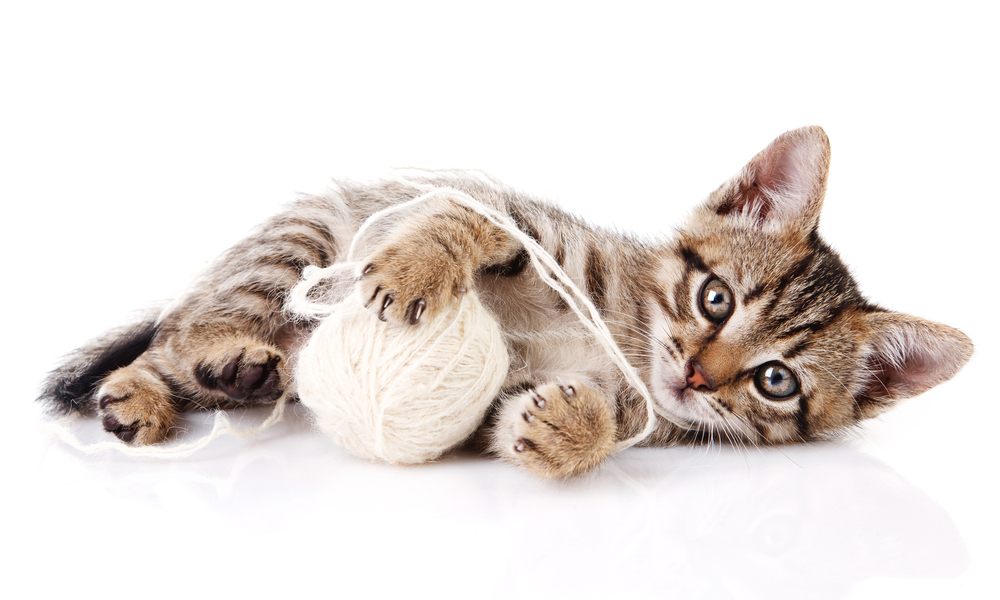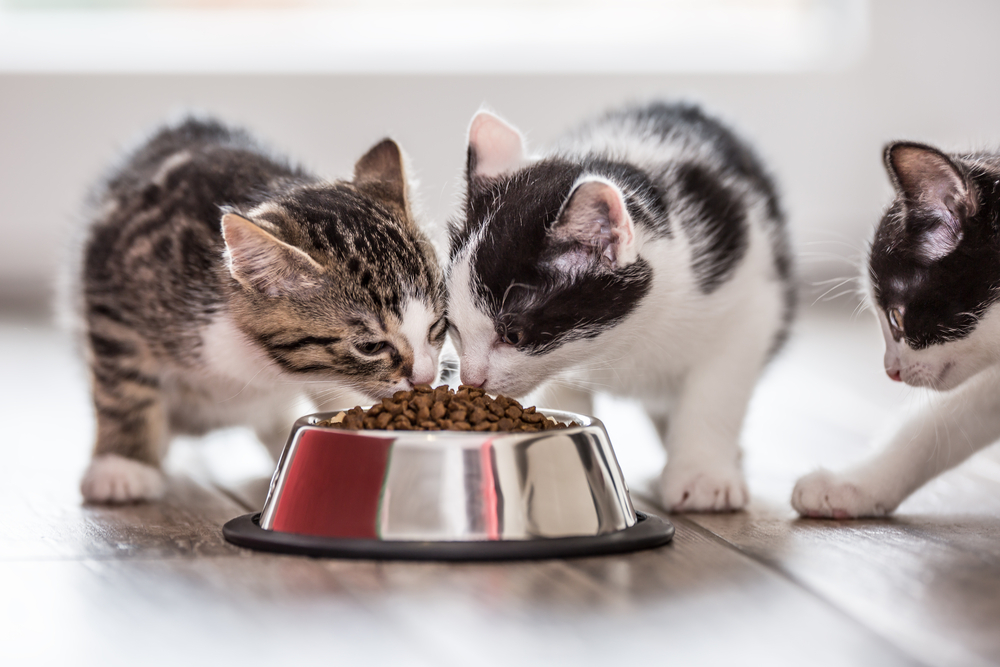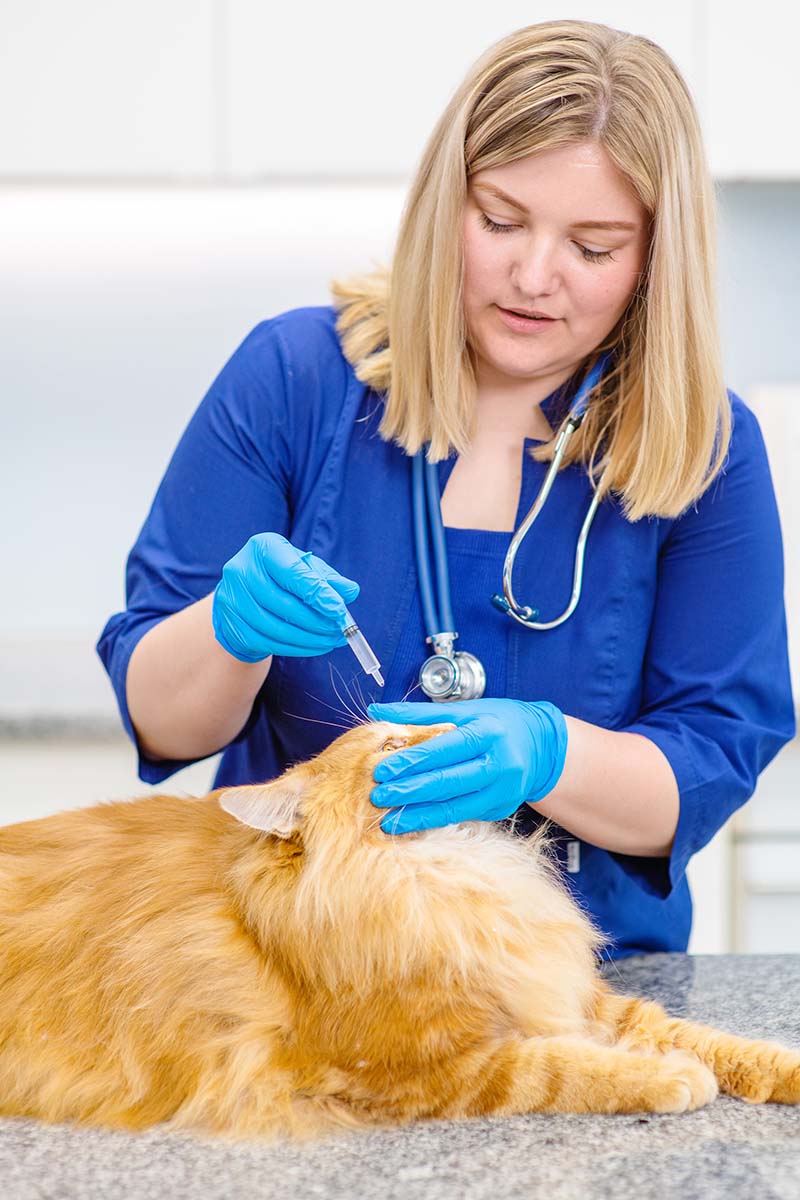Having a new kitten is very fun and exciting, watching as they explore, grow, and learn something new every day. Your first visit to the veterinarian with your kitten can be a little over whelming, so we wanted to list a few tips to help you raise your kitten healthy and happy.
Kitten Wellness
VIEW OUR KITTEN PACKAGES
Congratulations On Your New Kitten!
Pet Food & Nutrition
It is very important that your kitten is on a high quality pet food. Feeding your kitten table scraps (human food) or excessive amounts of treats is never a good idea because your kitten will become overweight. Overweight kittens become overweight, unhealthy adults. We would be happy to find you an appropriate food for your kitten.

Intestinal Parasites And Deworming
Most kittens have intestinal parasites. They can actually be passed to the kitten from the mother or very easily from other animals through contact with feces. Parasites are also transmitted by ingestion of mice, rabbits or any other type of rodent. Intestinal parasites live in the kitten’s stomach or attached to the intestinal walls and feed on their blood supply. Your kitten may have parasites if they have a poor hair coat, vomit, have black stools, or have a pot-bellied appearance.
Another important note is that some parasites can actually be transmitted to humans. This is why regular deworming schedule is important. Kittens should be dewormed 3-4 times approximately 2 weeks apart to make sure that all of the life stages have been killed. A regular deworming program should also be in place for your cat when it is an adult.

External Parasites And Prevention
External parasites include fleas, ticks, lice, mange, etc that can be picked up almost anywhere. Most parasites can be seen by the naked eye. These parasites can carry many diseases, such as heartworm or Lyme disease, that can make your kitten very ill or be even fatal. You should start using external parasite prevention at as young as 6 weeks and continue to use yearly typically throughout the warmer months.
Vaccination Schedule
Ideally kittens should be vaccinated 3 times, 3-4 weeks apart to build up good immunity. We start vaccines at 6 weeks of age. In this set of vaccines we vaccinate for; Feline Upper Respiratory Disease and Feline Panleukopenia which is a gastrointestinal disease. We booster this set again at 9 weeks along with Feline Leukemia which is an immunodeficiency disease. At 12 weeks of age we booster all the previous sets of vaccines to make sure they have a strong immunity against these disease. They also receive a rabies vaccine. All of the diseases above are very serious and can be sometimes fatal. They still occur in unvaccinated animals in our area. If your kitten is not vaccinated at 6 weeks, we start the vaccine series as early as possible. After the initial vaccine series they only need to be boosted every year.

Feline Vaccine Details
What better way to help your cat live a long and healthy life than to protect him or her today from future disease? Vaccination protects your cat from many common infectious diseases – which can be serious or even fatal. Vaccination enhances your cats quality of life. In addition, some infectious diseases, like rabies can also affect people, so vaccinating your cat also helps protect you and your family.
Feline Upper Respiratory Disease
While feline upper respiratory disease can be complicated by bacterial infections such as Chlamydiosis, it is primarily caused by two viruses – feline Rhinotracheitis virus and feline Calicivirus. These viruses are highly contagious and are easily transmitted by close contact with an infected cat. Infected cats can have flu like symptoms: fever, runny nose and eye infections, or oral ulcers. A vaccine is available, and typically included as part of your cat’s routine protocol.
Feline Panleukopenia
Feine Panleukopenia is caused by a parvovirus. This virus is very contagious, which is particularly concerning since it can remain stable in the environment for long periods of time. The symptoms Panleukopenia include sudden onset of severe vomiting and diarrhea. A vaccine is available for this often fatal disease, and included as part of your cat’s routine protocol.
Feline Leukemia
Feline Leukemia is a viral condition that attacks a cat’s immune system and leaves the vulnerable to many other secondary infections. The virus is shed in the saliva, urine and feces of an infected cat. Rsk exposure is therefore highest for cats that go outdoors and those that have direct contact with infected cats. Although many cats that become infected can live for many years, most will succumb to leukemia-associated diseases. Discuss with your veterinarian if your cat should be vaccinated for this disease.
Rabies
Rabies is an infectious disease caused by a virus that attacks the nervous system. Following a bite from an infected animal, the disease develops slowly over days to moths. In Canada, wildlife such as raccoons, skunks, foxes, and bats pose an ongoing risk of rabies. Because of the potential risk to humans, rabies vaccination is required by law in most jurisdictions. In unvaccinated cats, rabies is fatal.
Kitten Wellness Packages
These cost saving packages include everything your kitten needs for a healthy start including a comprehensive physical exam, vaccinations and so much more.
Spay/Neuter
Your kitten should be spayed (female) or neutered (male) at six months of age.
It is very important that you spay your female pet because:
- Spaying decreases the risk of uterine and mammary tumors.
- Older intact female cats commonly get infections in the uterus which is toxic and even fatal. The surgery to correct this infection can cost over $1000.00 compared to a less than $200.00 spay.
- Spaying prevents unwanted litters of kittens.
- Spaying eliminates annoying heat cycle behaviours such as vaginal bleeding, vocalization, and the strong desire to roam to find a mate.
It is very important that you neuter your male pet because:
- Unneutered male cats have an increased rate of testicular and prostate cancer.
- Neutering can prevent some types of aggression.
- Neutering can decrease frequent urination or spraying.
- Neutering can reduce the urge to roam to find a mate.

